
by Richard Timothy | Apr 23, 2012 | Non-Fiction, Observationally Speaking, Retorted Commercials
 So last night, my cutie-baby-sweetie-pie-wifey-pooh was getting ready for bed, i.e. brushing her teeth, washing her face, etc. and as she was finishing up I walked in and noticed that the counter around the front of the sink was covered with water. This begged the question, do people actually wash their face like you see in every face cleansing/acne preventing/makeup removing commercial ever made?
So last night, my cutie-baby-sweetie-pie-wifey-pooh was getting ready for bed, i.e. brushing her teeth, washing her face, etc. and as she was finishing up I walked in and noticed that the counter around the front of the sink was covered with water. This begged the question, do people actually wash their face like you see in every face cleansing/acne preventing/makeup removing commercial ever made?
You know the one (since they are essentially all the same one), a female with her hair pulled back out of her face, stands in front of a freely flowing faucet. The woman cups her hands together and fills them with water and then tosses it right into her glistening clean face. This is done in slow motion mind you to add to serenity of the whole experience, because slow water hitting you in the face has a feeling of peace, but at regular speed it just looks like you are trying to give yourself a nasal enema. As the slow motion continues we see water splash across and off of the woman’s face . . . and all around the rest of the bathroom.
Whenever I see those commercials, I always want to see what happens next, you know the minute or so after this happens when the lady’s roommate, spouse, lover (whoever really) walks into the bathroom sees water all over place and asks, “Why do you keep washing your face like that? Now get the mop and clean this mess up!”
 Apart from the slow motion tossing of water, I think how the way the lady has closed her eyes is the other thing I struggle with in these commercials. Their eyes are always lightly and serenely closed, like in those commercials where people are smelling a hot cup of their morning coffee. I get that the point of marketing is to sell, not just a product, but an idea or image associated with the product, but these commercials lead me to think that clearly the marketing gurus in charge have never ever seen a woman wash her face using their product. Here is process as I’ve witnessed it over the years:
Apart from the slow motion tossing of water, I think how the way the lady has closed her eyes is the other thing I struggle with in these commercials. Their eyes are always lightly and serenely closed, like in those commercials where people are smelling a hot cup of their morning coffee. I get that the point of marketing is to sell, not just a product, but an idea or image associated with the product, but these commercials lead me to think that clearly the marketing gurus in charge have never ever seen a woman wash her face using their product. Here is process as I’ve witnessed it over the years:
- Start with the extended duration of running the faucet to make sure the water temperature is the perfect face washing temperature.
- Tilt at the waist so the face is directly over the sink.
- Cup hands and fill will water.

- Squeeze eyes tightly shut then place face into hand cupped water.
- Release the cupped hands so the water (mostly) falls back into the sink.
- With eyes still tightly closed, fumble around the counter until you find the product you will be using to lather up your face.
- Lather up your face. Note: Eyes are still tightly closed.
- Fumble around the counter to find a dry washcloth.
- Dampen washcloth with the perfect-face-washing-temperature tap water (still running).
- With eyes still tightly shut, begin vigorously scrubbing face with the moist washcloth.
- Drop washcloth in or somewhere around the sink.
- Cup hands again and fill with water.
- Bring hands full of water up to your face, eyes still tightly closed, and let the water drop off face and (mostly) back into the sink.
- Repeat previous step until all the sudsy face product is removed from the face.
- Stand up straight and, with eyes still shut tight, feel around behind you until you come across a dry towel.
- Use towel to dab remaining moisture from face.
- Face the mirror and blink repeatedly until eyes adjust to the lights.
- Return towel to rack.
- Locate discarded washcloth and use it to wipe down all random puddles around the sink.
Congratulations, your face is now clean; it is officially time for bed.
 See in all of that there is no serene face, or lightly closed eyes. It is a vigorous scrubbing process with a product that warns you not to get it in your eyes, or mouth for that matter, which is why the face is always tightly squinched up during the entire face washing ordeal.
See in all of that there is no serene face, or lightly closed eyes. It is a vigorous scrubbing process with a product that warns you not to get it in your eyes, or mouth for that matter, which is why the face is always tightly squinched up during the entire face washing ordeal.
I’m not expecting this Smirk to inspire any change in the marketing world, but it would be nice if they occasionally tried to exercise a little creativity when it comes to washing your face. You know a fresh, maybe even clean, perspective on the matter.
Image Sources:
Google Images, keywords: washing face and face washing commercials.
Copyright © 2012 Richard Timothy

by Richard Timothy | Apr 12, 2012 | Non-Fiction, Observationally Speaking
 I’ve had plans on writing this Smirk for the past few years. I just never got around to it . . . until now, although it might have had something to do with my last Smirk about being left-handed. While researching leftie statistics I learned that it is more common for left-handed people to be dyslexic than right-handed people. Now, I’m not blaming my dyslexia on my hand preference, but it’s nice to know if I wanted to, I could.
I’ve had plans on writing this Smirk for the past few years. I just never got around to it . . . until now, although it might have had something to do with my last Smirk about being left-handed. While researching leftie statistics I learned that it is more common for left-handed people to be dyslexic than right-handed people. Now, I’m not blaming my dyslexia on my hand preference, but it’s nice to know if I wanted to, I could.
I’m writing about this mainly because . . . well I’m a writer who just so happens to have something that sometimes hinders my relationship with one of the things I love to do. I know that it affects people differently, and for me it’s kind of like a little yappy dog sitting on the sidewalk. I know I can get around it, but the faster attempt to move verses the closer I get it the yappier the thing gets and the more annoying it becomes.
I believe it was George Burns who said, “For me the toughest thing about dyslexia was learning to spell it.” I’m inclined to agree. Seriously, thank . . . whoever it was that came up with spellcheck, because I haven’t spelled dyslexic correctly once since starting this Smirk. Why would you use such a difficult word to describe a condition where people struggle with words and reading? The biggest problem with the word is that it carries with it the stigma of “unintelligent” or “stupid”. There are a lot of dyslexic people that hide in fear from that word, because they think it means they are less than others, and I should know . . . I was one of those people.
 I still remember the sheer terror the anxiety I felt when a teacher would announce that everyone would take a turn reading in class. I missed most of the story because I was too focused on trying to figure out the pattern the teacher was using when asking kids to take a turn. I was always grateful when it was each kid would read one page (or one paragraph), because it would be easy to find my section. On the occasions that I did figure it out, I would jump ahead to my designated page and would spend the whole time reading my page over and over again in my mind. That way when it got to be my turn I could read out loud at a more normal speed and not make as many mistakes. Even in college I had anxiety about reading out loud in class.
I still remember the sheer terror the anxiety I felt when a teacher would announce that everyone would take a turn reading in class. I missed most of the story because I was too focused on trying to figure out the pattern the teacher was using when asking kids to take a turn. I was always grateful when it was each kid would read one page (or one paragraph), because it would be easy to find my section. On the occasions that I did figure it out, I would jump ahead to my designated page and would spend the whole time reading my page over and over again in my mind. That way when it got to be my turn I could read out loud at a more normal speed and not make as many mistakes. Even in college I had anxiety about reading out loud in class.
I have a rather mild case of dyslexia. I don’t see words or letters upside down or backwards like in more severe cases, so I really have no idea what that experience is like. One think I’ve noticed is that I can read a book held right side up or upside down at about the same speed with the same level of concentration. I do read slowly, very slowly in fact. I believe the technical term for the rate at which I read is “slow as hell”. I do enjoy reading though, and marvel at people that can glance at a paragraph, or even a sentence, just for a moment and have read the entire thing. When I read anything I meticulously pronounce (or try to pronounce) every single word either out loud or in my head.
I like the idea of skimming something to get a basic overview, but for me skimming means that I scan over a paragraph and maybe get one or two words out of it. Then, realizing I have no idea what the paragraph is about, I go back and slowly and meticulously read every single word. This made taking tests a pain in too. I always ran out of time when taking any test, because I had to read each question two or more times to make sure I clearly understood what was being asked.
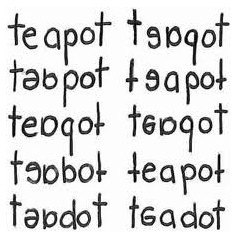 My biggest struggle with dyslexia has to do with certain words, or word sets that always throw me for a loop. My brain simply refuses to make a decision about which word is the correct one. Over the years I have gotten better at spotting them, but even today when I encounter them, my brain slows down drastically while I decipher which word it is I am reading/writing. I still only get them right about 80% of the time (on an average).
My biggest struggle with dyslexia has to do with certain words, or word sets that always throw me for a loop. My brain simply refuses to make a decision about which word is the correct one. Over the years I have gotten better at spotting them, but even today when I encounter them, my brain slows down drastically while I decipher which word it is I am reading/writing. I still only get them right about 80% of the time (on an average).
Some of these words/word sets include:
- what/that – Those closely related w/t words always make me struggle (as you can see), but “what” and “that” are the ones I struggle with most. I know the difference, and I know when they should be used and in what context, but (especially when reading them) they always cause my brain to hiccup and stutter when I get to them in a sentence.
- where/there
- when/then
- for/from/form
- “as” for “and” – This one is a “writing only” struggle, and a completely unconscious one at that. I know I want to use the word “and”, I’ll even say the word out loud as and write it down, but when I go back and check my writing, sure enough resting in some of my “and” spots is the word “as” taking its place.
- ends of words – This is another “writing only” challenge. What I am referring to here means things like “s” (I’m always making words plural when they clearly are not intended to be), “d” (as in “ed” endings, I am always adding the “d” if a word ends with an “e” like writing smiled when I intended to write smile). I also leave off endings of words all the time. I’ll even say the correct word in my mind, but end up leaving off the “ion” or “ing” (I did it earlier when I wrote “writing” I originally left off the ing and left the word as write).
There are plenty more, but you get the idea. I have some people tell me that they sometimes make these mistakes too, but the key difference is that they only do it sometimes, where as I make these mistakes all the time.
It may seem a little odd that someone who has struggled with written words his whole life would have such a love for them and want to spend his life working with them every day. It makes perfect sense to me, but then again I am the dyslexic one here.
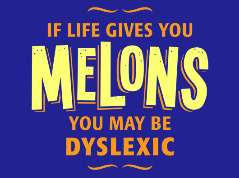 Humor has been a great tool in confronting and accepting my dyslexia. I’m not afraid to laugh at my struggles, and besides there are some pretty clever one-liners that cleverly address the topic, which just so happen to crack me up in the process. Things like the title of this Smirk. Others include:
Humor has been a great tool in confronting and accepting my dyslexia. I’m not afraid to laugh at my struggles, and besides there are some pretty clever one-liners that cleverly address the topic, which just so happen to crack me up in the process. Things like the title of this Smirk. Others include:
- Dyslexics of the world, untie!
- A dyslexic walks into a bra.
- Dyslexics have pet gods.
- Then life hands you MELONS, you might be dyslexic.
I’ve invested a lot of time and energy being afraid of people finding out about my deep dark dyslexic secret . . . a lot of wasted time, because what I’ve found out it that the person that cares the most about the fact you have dyslexia is you.
 Once I learned to accept myself for who I was, instead of who I wished I was, or who I would never be as good as, it didn’t matter if I didn’t always use the right word, when writing, or that it took me three or four times longer to read a page than others. It was ok that I made mistakes, and if anyone asked I had a reason why I made them. The more I embraced myself, the more I wrote, errors and all, and the more I wrote fewer errors I started to have. Does that mean that I’ll someday write 100% error free? No, and the best part is, I’m perfectly happy that that is the case. It’s who I am. Besides, it doesn’t matter because there are people out there, friends, family, random Facebook acquaintances, even professionals, who will help me out if I ask, and I’m no longer afraid to ask.
Once I learned to accept myself for who I was, instead of who I wished I was, or who I would never be as good as, it didn’t matter if I didn’t always use the right word, when writing, or that it took me three or four times longer to read a page than others. It was ok that I made mistakes, and if anyone asked I had a reason why I made them. The more I embraced myself, the more I wrote, errors and all, and the more I wrote fewer errors I started to have. Does that mean that I’ll someday write 100% error free? No, and the best part is, I’m perfectly happy that that is the case. It’s who I am. Besides, it doesn’t matter because there are people out there, friends, family, random Facebook acquaintances, even professionals, who will help me out if I ask, and I’m no longer afraid to ask.
 If you are dyslexic (or know someone who is), it’s ok to ask for help, we all need it at times. Don’t be afraid, the fear of people finding out, is more crippling that your dyslexia ever will be. You’re not broken or defective, just wired a little different when it comes to dealing with printed words. And if you’re afraid to accept your dyslexic self, just remember you are not alone. Steve Jobs, Thomas Edison, Erin Brockovich, Pablo Picasso, George Burns, Richard Branson, Hans Christian Andersen, Salma Hayek, Charles Schwab, John Irving, Anthony Hopkins, Albert Einstein, me, and you are just a few of the people who have lived on this planet who have had dyslexia. I don’t know about you, but I’d say we’re in pretty good company.
If you are dyslexic (or know someone who is), it’s ok to ask for help, we all need it at times. Don’t be afraid, the fear of people finding out, is more crippling that your dyslexia ever will be. You’re not broken or defective, just wired a little different when it comes to dealing with printed words. And if you’re afraid to accept your dyslexic self, just remember you are not alone. Steve Jobs, Thomas Edison, Erin Brockovich, Pablo Picasso, George Burns, Richard Branson, Hans Christian Andersen, Salma Hayek, Charles Schwab, John Irving, Anthony Hopkins, Albert Einstein, me, and you are just a few of the people who have lived on this planet who have had dyslexia. I don’t know about you, but I’d say we’re in pretty good company.
Image Sources:
Google Images, keywords:dyslexics are teople poo, anxiety, dyslexia, if life gives you melons, adults reading, and famous dyslexics.
Copyright © 2012 Richard Timothy
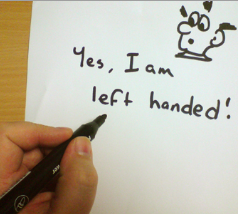
by Richard Timothy | Apr 3, 2012 | Non-Fiction, Observationally Speaking, When I Was a Kid
 I am left-handed, which oddly makes me instantly more likeable to about 10 to 15% of you, because that is the average number of people that are left-handed verses right-handed. Most of you, however, could care less . . . or more . . . or at all for that matter.
I am left-handed, which oddly makes me instantly more likeable to about 10 to 15% of you, because that is the average number of people that are left-handed verses right-handed. Most of you, however, could care less . . . or more . . . or at all for that matter.
A few weeks ago I was hanging out with the family and sister was commented that there was a good chance her little one, Margot was going to be left-handed, since it was the hand she’s been favoring as of late. What surprised me is how proud I was from this little bit of information. Being left-handed is a life-long club, one that you instantly become a part of once you find preference in using your left hand verses your right.
 I got a smirk on my face when I started think of Margot and all of the challenges and compromises she’ll have to make growing up, things that I have already gone through and know she’ll have to experience as well. They are not bad things mind you, just . . . more tediousness, due to living into the righties world. I do know she’ll have an avid and deep rooted hatred for spiral bound notebooks . . . all lefties do thanks to the spirals digging into the side of our palm and wrist as we are write in them, leaving a intended spiral ribbed texture on our arms when we lift up our arm. Three ring binders are just as much of a pain thanks to those big ass hoops that you have to maneuver around while when you start a new line close to one of those three holes. Eventually I learned to start at the back of my notebook so the spirals were on the right, but the damage was done, I still hate spiral bound notebooks.
I got a smirk on my face when I started think of Margot and all of the challenges and compromises she’ll have to make growing up, things that I have already gone through and know she’ll have to experience as well. They are not bad things mind you, just . . . more tediousness, due to living into the righties world. I do know she’ll have an avid and deep rooted hatred for spiral bound notebooks . . . all lefties do thanks to the spirals digging into the side of our palm and wrist as we are write in them, leaving a intended spiral ribbed texture on our arms when we lift up our arm. Three ring binders are just as much of a pain thanks to those big ass hoops that you have to maneuver around while when you start a new line close to one of those three holes. Eventually I learned to start at the back of my notebook so the spirals were on the right, but the damage was done, I still hate spiral bound notebooks.
 I know that many of you have no idea what I’m talking about, you have no reason to, but trust me when I tell you that when it comes to basic functionality/usability, the world favors the right. Take school desks . . . always obnoxious to a leftie, at least at my school. The desk and chair was an all-in-one combined object. The only access to your seat was the opening on the left. This design meant that all right-handed people had an arm rest while they wrote and did school work, but as a lefty I had to get used to doing my work with no arm support whatsoever.
I know that many of you have no idea what I’m talking about, you have no reason to, but trust me when I tell you that when it comes to basic functionality/usability, the world favors the right. Take school desks . . . always obnoxious to a leftie, at least at my school. The desk and chair was an all-in-one combined object. The only access to your seat was the opening on the left. This design meant that all right-handed people had an arm rest while they wrote and did school work, but as a lefty I had to get used to doing my work with no arm support whatsoever.
Being a lefty there are a number of things you pick up on that I imagine right-handed people never go through. For one, there is a lot of odd bias about being left-handed. Right handed people always make a big deal about you being a “southpaw”, which the first time I was called one I thought it was a derogatory word. I was in gym class, and as I stepped up to the plate to take a turn at bat my coach said “Oh, so you’re a southpaw!” I honestly thought he was a big “meanie-head”, and spent a year secretly wishing that a bird would crap on his head every time we had P.E. outside for calling me names in front of my class mates.
One thing you get used to early on is that right-handed people are ways surprised when they learn you are left-handed. Exclaiming that fact the second they realize it, but it’s one of those little weird facts about that most righties don’t keep with them, and is something that will keep coming up with random acquaintances from probably the rest of your life. When a lefty learns you are left-handed they usually just give you an approving nod and hope that someday they’ll be able to share a meal with you. We always let out a sigh of relief when we are sitting at a round dinner table and discover that the person next to us is also left handed.
Most righties don’t know this, but lefties don’t like round tables. Ten out of ten times if we have the choice to eat dinner with others at a round table verses a one with corners we are going to go square every time. When a left-hander walks up to a table we always think about the most strategic place to sit so that we do not bump elbows with right-handers. Right-handed people never think about this because, chances are, they’ve never had to deal with this on a daily basis, three times a day. When lefties see the table they will be sitting at, they process the information and find the spots that will allow them free left-handed movement for a hassle free meal.
Another thing about being left handed is that is that there are so many negative connotations toward just the word “left”. Here’s what I mean (according to Wikipedia mind you):
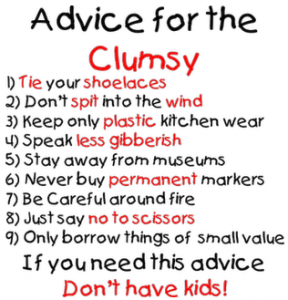
- In Latin the word for left eventually took on the meaning of “evil” or “unlucky”.
- In French, Dutch, and Hebrew the word for left means clumsy, which I guess makes perfect sense—have you ever seen a right-handed person trying to do something with their left hand, they look silly as hell. And yes the same can be said for left-handers doing most things with their right hand. I always get a good chuckle at myself whenever I attempt to throw anything with my right hand.
- In Chinese, the adjective for left can mean improper or out of accord.
- In Russian it means unauthorized and/or under the table.
- In ancient Hebrew the left hand symbolized the power to shame society, and was used as a metaphor for misfortune, natural evil, or punishment from the gods.
On a plus note (yep, only two):
- People in the Andes consider left-handers to possess special abilities, like magic and healing.
- For Tantric Buddhists the left hand represents wisdom.
There are a number of odd superstitions/myths about things of a left handed nature:
- It is bad luck to pass a drink to someone with your left hand. Likewise, pouring a drink with your left hand isn’t going to bring you luck!
- Giving a toast with your left hand is the same as placing a curse on the person(s) you are toasting.
- It is considered bad luck to attach the left sleeve before sewing on the right one.
- Getting out of bed left foot first will result in you having a bad day.
- If your left eye twitches you will see an adversary, but if it is your right eye, you will see a friend.
- An itch on your left palm this means you will need to pay some money out, but if it’s on your right palm you will be the one receiving the cash.
- The tradition of wearing your wedding ring on the left hand was started by Romans, who used the ring to ward off evil associated with the left.
- People believed that evil spirits would skulk behind your left shoulder. In Roman times salt was a very valuable commodity and it was seen as extremely bad luck to spill some. This is why if you spill salt you should throw it over the left shoulder – to appease the Devil.
- If your right ear is ringing it means that someone is praising you, whereas if it’s in your left someone is cursing you.
And this left=bad, right=good superstition just goes on and on. Interestingly though, if you are a lefty you do end up associating left with good.
There are some superstitions in favor of lefties, for example:
- If you dig coal out of the ground from under your left foot in the spring your luck will be quite good.
- Some tribes, like the Zuni, think that left is older and wiser than the right.
There are a few actual facts about lefties that I found surprising when I started looking into this whole left/right thing:
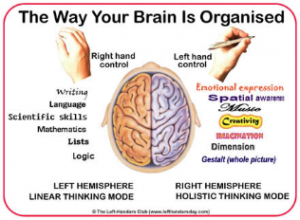
- Left-handed people are three times more likely to become alcoholics than right-handers.
- According to one study, left-handers life span is 9 years less than right-handers—which makes perfect sense considering they are three times more likely to be alcoholics.
- Statistically speaking, the older a mother, the more likely she is to give birth to a left-handed child.
- If both parents are left handed, 50% of their children will be left-handed, however if both parents are righties, there is only a 2% chance the child will be left-handed.
- Lefties are twice as likely to be male.
- Lefties tend to reach puberty 4 to 5 months later than right-handers.
- As a result of living in a right-handers world, 50% of left-handers report using a computer mouse with their right hand, 68% of lefties use right handed scissors, and 74% use a dinner knife with their right hand.
- Stuttering and dyslexia occur more often in left-handers (particularly if they are forced to change their writing hand as a child, like King of England, George VI).
- Lefties also adjust to seeing underwater quicker.
- 1 in 4 Apollo astronauts were left-handed.
- 4 of the 5 original designers of the Macintosh computer were left-handed.
- Lefties with a college education make 10 to 15% more than their right-handed equivalents.
- Plus, we even have our own day! Left Handed Day is celebrated each year on August 13th, which is pretty cool.
 So to all my left-handed readers, thanks for reading and know I feel your pain and celebrate your accomplishments. And to all my right-handed readers, thanks for reading, and hopefully you gained a little insight to your left-handed counterpart in humanity. Just remember, sometimes left is right.
So to all my left-handed readers, thanks for reading and know I feel your pain and celebrate your accomplishments. And to all my right-handed readers, thanks for reading, and hopefully you gained a little insight to your left-handed counterpart in humanity. Just remember, sometimes left is right.
Image Sources:
My sister’s Facebook page and Google Images, keywords: left handed, school desks, clumsy, right brained, left turn.
Copyright © 2012 Richard Timothy

by Richard Timothy | Mar 22, 2012 | My Cutie Baby Sweetie Pie, Non-Fiction, Observationally Speaking
 To those that have been following my Smirks for the past few years know that once a year my sweetie-baby-cutie-pie-wifey-pooh puts on a woman’s conference called Ignite Your Spark (my Smirk from Year 1 and Year 2). The desire, goal, hope, dream for this event is that it will give the women attending a place to remember their greatness, find their voice, be reminded of their beauty, and know their worth. In short it is a conference dedicated to empowering women.
To those that have been following my Smirks for the past few years know that once a year my sweetie-baby-cutie-pie-wifey-pooh puts on a woman’s conference called Ignite Your Spark (my Smirk from Year 1 and Year 2). The desire, goal, hope, dream for this event is that it will give the women attending a place to remember their greatness, find their voice, be reminded of their beauty, and know their worth. In short it is a conference dedicated to empowering women.
Even though I may be estrogen challenged, I can tell you that every man that attends the conference (there where around six or seven of us) got value and worth from the event as well. Embracing your live and who you are as a person is not a woman-only concept and with each presentation I attended, there were nuggets of wisdom, little quotes that get you to think, or, as Oprah and coined it, “ah-ha moments” that stick with you, and if you integrate them into your life, they can make your world a better place.
I did have a few ah-ha’s this year, like always, and I even had a Smirk come to me in the middle of the conference as well. Something I consider true for everyone, even though most people would choose not to talk about it. For now though, here are a few of “ponder this” one-liners I wrote down:
 100% of us want to change the world, but 80% of us are not willing to change our world.
100% of us want to change the world, but 80% of us are not willing to change our world.
I liked this one because I’ve been there. Hell, I even still visit from time to time. I’ve spent time in a place I didn’t want to be in, with a person I wasn’t sure I liked at the time, which turned out to be me. My theory is this, if you are not inspired by your own life, how are you going to use it to inspire the lives of others? I’ve changed from those old uninspired days. I’ve worked on and made a life that I love, and it’s from the joy that I’m able to focus on the joys of life in my writing, and from that I can bring joy to the lives of others, which, in my own small way, makes the world a better place.
One of big things about these types of events is that it can help remind people of their own worth. People have a tendency to forget how brilliant and amazing they are, that they have a voice and something worth saying. I know some people do great things and keep it to themselves, hence that section on donation forms for non-profits and such that specifies you want to keep your donation to be kept anonymous instead of drawing any attention to yourself. There are times when I think people should own when they do something they’re proud of, and it’s ok to let others know it too. At this year’s event Angela and I both chopped off our hair and donated it to cancer patients.
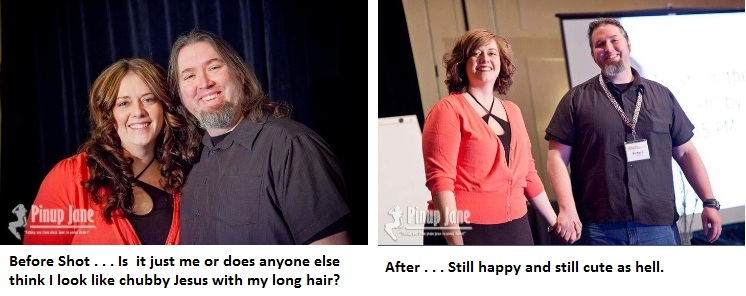
Our hair will be made into wigs for patients who have lost all their hair and cannot afford to buy one. It felt good to cut my hair. Truth is I would have been perfectly happy to cut my hair about eight months ago, but in order to get it to a donateable length I had to put it off for a while. My new do does look great though, and this is something I’ve always wanted to do. I’m no longer shedding all over the house, and it’s something I’m proud I did. So acknowledge yourself when you do something great, you deserve it.
As for the Smirkful epiphany I had at the event . . . have you ever been to an event/conference where you have your own room where the event is taking place? Ignite was at the Marriott Hotel in downtown Salt Lake City, and since it was a two day event, we had a room there for a few days. During lunch on the first day, I went up to our room and had this thought, which I do believe is the number one best part about having your own room at a convention . . . you have a private place to go when you need to release a little backed up air that you’ve been keeping tucked away inside you for the past few hours.
 I don’t think anyone will admit that this is the best reason for getting your own room at a convention, but let’s face it, if you do go to conventions, it is. How many times have your been walking around from meeting to meeting, or setting in multiple training sessions and then when you get a break you make a little pit stop at your room and the second you get in there and the door latches behind you, you just cut loose. I do think the buildup is a result of the carb-only continental breakfast you get complimentary with your room. Even if people won’t admit it, deep down they know it’s the truth.
I don’t think anyone will admit that this is the best reason for getting your own room at a convention, but let’s face it, if you do go to conventions, it is. How many times have your been walking around from meeting to meeting, or setting in multiple training sessions and then when you get a break you make a little pit stop at your room and the second you get in there and the door latches behind you, you just cut loose. I do think the buildup is a result of the carb-only continental breakfast you get complimentary with your room. Even if people won’t admit it, deep down they know it’s the truth.
If you want to know if any of your friends have taken a gas break at conventions, have them read this Smirk, chances are if they start laughing at this part, they are guilty of the hotel room pass and dash. And if you have not yet gone to a conference that takes place in a hotel, when you do, splurge and get a room there, it take off a lot a pressure . . . trust me.
Image Sources:
Pinup Jane (who took amazing photos for the Ignite Your Spark conference), Ignite Your Spark website and Google Images, keywords: happiness and passing gas.
Copyright © 2012 Richard Timothy

by Richard Timothy | Mar 5, 2012 | Holiday Banter, I Think There's a Point, Nearly News, Non-Fiction, Observationally Speaking, Something I Know Nothing About
 When I took a look at month of February for one of last month’s Smirks I was so amused by what I learned that I thought it might be fun to dedicate one Smirk a month this year to learning a little more about each month. So for the first Smirk of March, why not share what I learned about this month, the only month of the year that can be a verb as well as a noun.
When I took a look at month of February for one of last month’s Smirks I was so amused by what I learned that I thought it might be fun to dedicate one Smirk a month this year to learning a little more about each month. So for the first Smirk of March, why not share what I learned about this month, the only month of the year that can be a verb as well as a noun.
When it comes to March, I’ve always assumed that there is some type of Irish theme associated with it due to St. Patrick’s Day being in the middle of it. Turns out I was right because March is Irish-American Heritage Month. Of course it not just Irish-American Heritage Month, they do have to share it with others. As it turns out March is also:

- National Kidney Month
- National Nutrition Month
- Women’s History Month
- Greek-American Heritage Month
- National Brain Injury Awareness Month
- Endometriosis Awareness Month
- Juvenile Arthritis Awareness Month
- Self-Harm Awareness Month
- National Essential Tremor Awareness Month
- “Help Fight Liver Disease” Month
- Red Cross Month
- National Colorectal Cancer Awareness Month
- National Epilepsy Month
- Supply Management Month
A few of those make perfect sense, but only after you juxtapose them with St. Patrick’s Day and the mass consumption of alcohol as the only acceptable ways to correctly celebrate the day. Drinking can do a number to your kidneys and liver, so having the month dedicated to both kidneys and liver disease makes perfect sense.
The same can be said for brain injury and self-harm. Next to New Years, I would assume St. Patrick’s Day has the second highest cumulative loss of brain cells in the span of a twenty-four hour period than any other holiday celebrated each year. And I imagine the amount of harm people do to themselves due to the mass consumption of green beer and dressing up like leprechauns is higher this month than any other month of the year as well.
 Apart from an entire month of awareness or celebration towards one specific theme, some themes feel that all they really need is just a week for make their mark spreading awareness to the world. The 4th -10th of March is National Social Work Week. In honor of this week I’ve been working on my social skills by memorizing one clean joke for every dirty one I like to share in social settings. The 12th-18th is Brain Awareness Week, and I’ve already got my zombie costume pulled out of storage and ready to go. Today starts National Sleep Awareness Week, so in honor of this week I shall be taking a nap every single day from now until the 11th. This week is going to be kick ass. The 13th starts World Rotaract Week, which has something to do with Rotary clubs, which is a club where a group of people helps others and not a club that rotates . . . and no I will not admit that I had to look that up.
Apart from an entire month of awareness or celebration towards one specific theme, some themes feel that all they really need is just a week for make their mark spreading awareness to the world. The 4th -10th of March is National Social Work Week. In honor of this week I’ve been working on my social skills by memorizing one clean joke for every dirty one I like to share in social settings. The 12th-18th is Brain Awareness Week, and I’ve already got my zombie costume pulled out of storage and ready to go. Today starts National Sleep Awareness Week, so in honor of this week I shall be taking a nap every single day from now until the 11th. This week is going to be kick ass. The 13th starts World Rotaract Week, which has something to do with Rotary clubs, which is a club where a group of people helps others and not a club that rotates . . . and no I will not admit that I had to look that up.
There are a few days this month that I found to be points of interest as well.

- 6 – World Glaucoma Day – You would think that this would happen during Marijuana Awareness Month (February in case you were wondering).
- 8 – International Women’s Day
- 14 – Pi Day – I’m going to get blueberry! (Insert smiley face here.)
- 22 – World Water Day
- 23 – World Meteorological Day
- 24 – World Tuberculosis Day
- 26 – Purple Day
- 31 – World Backup Day
I guess the nice thing is, if I decide to actually pay attention to any of those days at least I’ll know what I’ll be wearing for two days this month. I am a little stoked about it being Greek-American Heritage Month as well; it’s a great excuse to get gyros at least once a week this month for dinner, because I do love a good gyro.
I hope you enjoyed this March Awareness Smirk, and maybe, apart from drinking something green on the same day you dress in something green, you’ll get a little more out of March this year than years past, but regardless if you do or don’t, Cheers! And a Happy March to you all.
Image Sources:
Google Images, keywords:March, Women’s History Month, sleep at work, and Pi Day.
Copyright © 2012 Richard Timothy
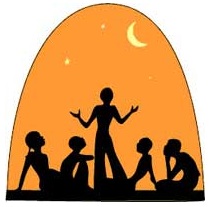
by Richard Timothy | Feb 29, 2012 | I Think There's a Point, Non-Fiction, Observationally Speaking
 I’ll be the first to admit that it sucks when you are in the middle of telling a truly brilliant story and you realize no one is listening. That being said, I think it’s much worst when you’re in the middle of telling a truly brilliant story to a captivated audience, hanging on your every word, and as you get closer to the highlight of the story you realize it is completely inappropriate for the person (or persons) you are telling it to.
I’ll be the first to admit that it sucks when you are in the middle of telling a truly brilliant story and you realize no one is listening. That being said, I think it’s much worst when you’re in the middle of telling a truly brilliant story to a captivated audience, hanging on your every word, and as you get closer to the highlight of the story you realize it is completely inappropriate for the person (or persons) you are telling it to.
It’s not like I make a habit out of this, but there have been times where, when chatting away to co-workers, neighbors, friends, religious relatives, a preacher at a wedding I’m attending (I could keep going, but I think you get the point) and I happen to end up on some tangent that is a bit lacking in appropriateness once I get to the pinnacle of the story. Fortunately, I’ve gotten pretty good and catching these instances before the punch line. This was, in the event that it does happen, I have a little time to prepare a completely lame ending that only reflects poorly on my story telling skills and does not give the listener an emotional slap across the face and gets my name placed on the top of their “People my mother warned me about” list.
Then there are those few times where, as the punch line is coming out of my mouth, the realization hits me, which is always been followed by the thought, “Ah shit.” The example that always comes to mind happened in college as I was finishing my Bachelor’s degree. There was a big job fair going on where reps from different companies from across the country showed up to interview a barrage of fresh new faces entering the job market with the goal of filling a few open positions.
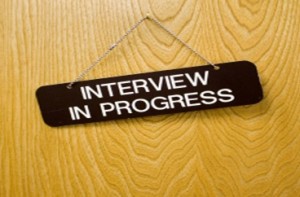 I had managed to set up an interview with some bloke from IBM who was from a facility in Silicon Valley. The interview, I felt, was going quite well. We had a good rapport going, and had been chatting for about twenty minutes. Of course it could have been that after a full day of interviews this guy was just happy to have someone to kick back and chat with and I was more than happy to oblige, and if it added to my chance at getting a job at IBM, that much the better.
I had managed to set up an interview with some bloke from IBM who was from a facility in Silicon Valley. The interview, I felt, was going quite well. We had a good rapport going, and had been chatting for about twenty minutes. Of course it could have been that after a full day of interviews this guy was just happy to have someone to kick back and chat with and I was more than happy to oblige, and if it added to my chance at getting a job at IBM, that much the better.
We talked about books and travel and he started talked about living on the east coast verses the west coast, and how much more he liked the west coast. In an attempt to show how intellectual and “with it” I was myself tried to juxtaposed the two locations by citing, by sharing “part of Kurt Vonnegut’s commencement speech to the 1997 graduating class of MIT”, which for the record is completely wrong, the piece was actually an article titled “Advice, like youth, probably just wasted on the young” written by Mary Schmich and published in the Chicago Tribune as a column in 1997, but at the time I didn’t know this.
 I proceeded to share part of the “speech” with him that goes, “Live in New York City once, but leave before it makes you hard. Live in Northern California once, but leave before it makes you soft.” . . . Ah shit. I thought right after I said it. I tried to back pedal and cover it up, something about it being “some writers” opinion, which was probably just said for a laugh, but it was too late. I had just inadvertently called this man soft to his face. He knew it and I knew it and at that point, the job interview was over.
I proceeded to share part of the “speech” with him that goes, “Live in New York City once, but leave before it makes you hard. Live in Northern California once, but leave before it makes you soft.” . . . Ah shit. I thought right after I said it. I tried to back pedal and cover it up, something about it being “some writers” opinion, which was probably just said for a laugh, but it was too late. I had just inadvertently called this man soft to his face. He knew it and I knew it and at that point, the job interview was over.
In the end I guess things worked out for the best. I ended up getting a job at a small company in town. I didn’t have to move anywhere after graduating which was kind of nice, and it just so happened that I ended up meeting the love of my life at that job. I guess if I was one to look at life as some kind of competition in that situation, I won. Plus, it does make for a pretty good Smirk.
Image Sources:
Google Images, keywords: telling a story, interview, and hand over mouth.
Copyright © 2012 Richard Timothy

 So last night, my cutie-baby-sweetie-pie-wifey-pooh was getting ready for bed, i.e. brushing her teeth, washing her face, etc. and as she was finishing up I walked in and noticed that the counter around the front of the sink was covered with water. This begged the question, do people actually wash their face like you see in every face cleansing/acne preventing/makeup removing commercial ever made?
So last night, my cutie-baby-sweetie-pie-wifey-pooh was getting ready for bed, i.e. brushing her teeth, washing her face, etc. and as she was finishing up I walked in and noticed that the counter around the front of the sink was covered with water. This begged the question, do people actually wash their face like you see in every face cleansing/acne preventing/makeup removing commercial ever made? Apart from the slow motion tossing of water, I think how the way the lady has closed her eyes is the other thing I struggle with in these commercials. Their eyes are always lightly and serenely closed, like in those commercials where people are smelling a hot cup of their morning coffee. I get that the point of marketing is to sell, not just a product, but an idea or image associated with the product, but these commercials lead me to think that clearly the marketing gurus in charge have never ever seen a woman wash her face using their product. Here is process as I’ve witnessed it over the years:
Apart from the slow motion tossing of water, I think how the way the lady has closed her eyes is the other thing I struggle with in these commercials. Their eyes are always lightly and serenely closed, like in those commercials where people are smelling a hot cup of their morning coffee. I get that the point of marketing is to sell, not just a product, but an idea or image associated with the product, but these commercials lead me to think that clearly the marketing gurus in charge have never ever seen a woman wash her face using their product. Here is process as I’ve witnessed it over the years: See in all of that there is no serene face, or lightly closed eyes. It is a vigorous scrubbing process with a product that warns you not to get it in your eyes, or mouth for that matter, which is why the face is always tightly squinched up during the entire face washing ordeal.
See in all of that there is no serene face, or lightly closed eyes. It is a vigorous scrubbing process with a product that warns you not to get it in your eyes, or mouth for that matter, which is why the face is always tightly squinched up during the entire face washing ordeal.























